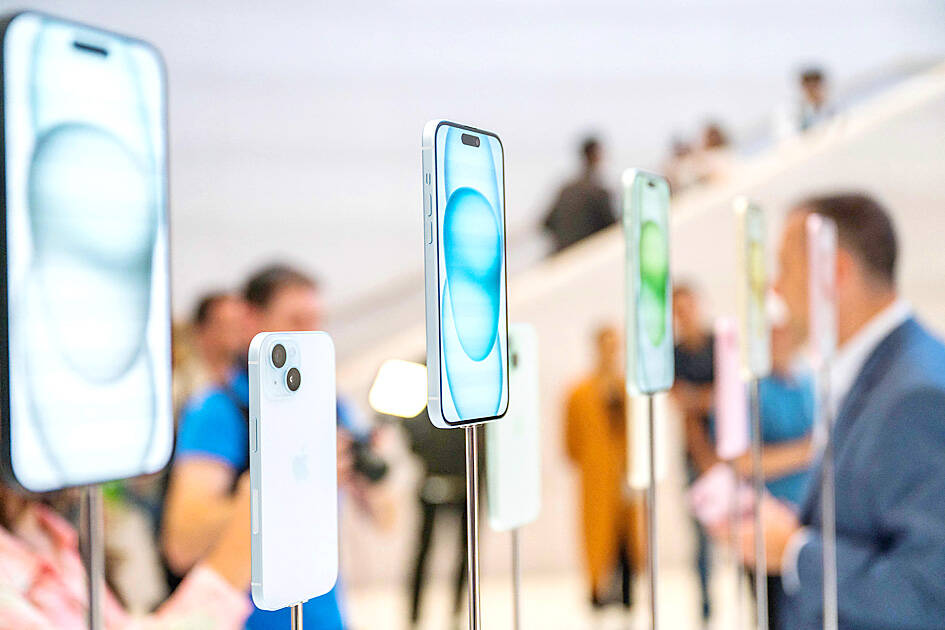Apple Inc on Tuesday unveiled its new iPhone lineup, with its Lightning charger ports replaced on the newest models by a universal charger after a tussle with the EU.
The European bloc is insisting that all phones and other small devices must be compatible with USB-C charging cables from the end of next year, a move it says would reduce waste and save money for consumers.
“USB-C has become a universally accepted standard. So we’re bringing USB-C to iPhone 15,” Apple vice president of iPhone marketing Kaiann Drance said at a launch event.

Photo: AFP
The update to Apple’s line comes as the Silicon Valley tech giant faces declining sales of iPhones, with premium prices pushing customers to delay switching to newer models.
The firm is also caught up in diplomatic turbulence between the US and China, with reports saying Beijing is banning civil servants from using its phones.
In the most recently ended quarter, Apple reported a 2.4 percent drop in iPhone sales, which account for nearly half of total revenue.
The firm reported US$15.8 billion in revenue from China in the quarter, accounting for nearly 20 percent of total revenue.
Executives pointed to the uptick in China sales in a period when overall sales fell.
Along with improvements to iPhone cameras and chips, Apple said that the iPhone 15, of which there are four varieties, would have internal components that simplify repair and a new frame that allows the back glass to be easily replaced.
In a surprise move, Apple said the iPhone 15 Pro would cost US$999 which is unchanged from its predecessor, while the iPhone 15 Pro Max would start at US$1,199, an increase of US$100.
In Taiwan, preorders for Apple’s latest iPhones are to start tomorrow, Apple Taiwan’s Web site says.
The iPhone 15 series would be available from Friday next week at prices ranging from NT$29,900 to NT$58,900 (US$935 to US$1,842), it said.
Apple on Tuesday also unveiled new models of the Apple Watch that would respond to a tap of the index finger and thumb to start and stop calls or other key functions.
Separately, Apple yesterday said that its iPhone 12 model was certified by multiple international bodies as compliant with global radiation standards, after a French watchdog ordered it to stop selling the handset on the grounds that it breaches European exposure limits.
France’s radiation watchdog ANFR told Apple on Tuesday to halt sales of iPhone 12s in France after tests that it said showed the phone’s specific absorption rate (SAR) — a measure of the rate of radiofrequency energy absorbed by the body from a piece of equipment — was higher than legally allowed.
The ANFR said it would send agents to Apple stores and other distributors to check that the model was no longer being sold.
Apple said it had provided ANFR with multiple Apple and independent third-party lab results proving its compliance with all applicable SAR regulations and standards in the world.
The firm said it was contesting the results of AFNR’s review and would continue to engage with the agency to show it is compliant.
Additional reporting by Reuters and staff writer

The US dollar was trading at NT$29.7 at 10am today on the Taipei Foreign Exchange, as the New Taiwan dollar gained NT$1.364 from the previous close last week. The NT dollar continued to rise today, after surging 3.07 percent on Friday. After opening at NT$30.91, the NT dollar gained more than NT$1 in just 15 minutes, briefly passing the NT$30 mark. Before the US Department of the Treasury's semi-annual currency report came out, expectations that the NT dollar would keep rising were already building. The NT dollar on Friday closed at NT$31.064, up by NT$0.953 — a 3.07 percent single-day gain. Today,

‘SHORT TERM’: The local currency would likely remain strong in the near term, driven by anticipated US trade pressure, capital inflows and expectations of a US Fed rate cut The US dollar is expected to fall below NT$30 in the near term, as traders anticipate increased pressure from Washington for Taiwan to allow the New Taiwan dollar to appreciate, Cathay United Bank (國泰世華銀行) chief economist Lin Chi-chao (林啟超) said. Following a sharp drop in the greenback against the NT dollar on Friday, Lin told the Central News Agency that the local currency is likely to remain strong in the short term, driven in part by market psychology surrounding anticipated US policy pressure. On Friday, the US dollar fell NT$0.953, or 3.07 percent, closing at NT$31.064 — its lowest level since Jan.

The New Taiwan dollar and Taiwanese stocks surged on signs that trade tensions between the world’s top two economies might start easing and as US tech earnings boosted the outlook of the nation’s semiconductor exports. The NT dollar strengthened as much as 3.8 percent versus the US dollar to 30.815, the biggest intraday gain since January 2011, closing at NT$31.064. The benchmark TAIEX jumped 2.73 percent to outperform the region’s equity gauges. Outlook for global trade improved after China said it is assessing possible trade talks with the US, providing a boost for the nation’s currency and shares. As the NT dollar

The Financial Supervisory Commission (FSC) yesterday met with some of the nation’s largest insurance companies as a skyrocketing New Taiwan dollar piles pressure on their hundreds of billions of dollars in US bond investments. The commission has asked some life insurance firms, among the biggest Asian holders of US debt, to discuss how the rapidly strengthening NT dollar has impacted their operations, people familiar with the matter said. The meeting took place as the NT dollar jumped as much as 5 percent yesterday, its biggest intraday gain in more than three decades. The local currency surged as exporters rushed to